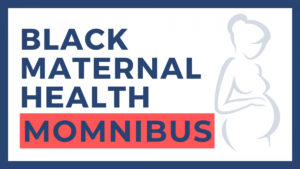24 Feb Momnibus Act Protects and Supports Black Mothers
 February 24, 2021
February 24, 2021
Black History Month may be coming to an end. But efforts to combat the racial inequities that have long plagued our healthcare system should — and must — continue.
The United States is in the midst of a maternal health crisis that disproportionately affects our communities of color. Black mothers face a particularly grim reality — they are three to four times more likely to die from pregnancy complications than white mothers. Their odds of surviving childbirth are on par with those in poverty-stricken countries like Mexico and Uzbekistan.
Put plainly, we as a nation, are failing these women.
But a bill introduced this month by members of the Black Maternal Health Caucus could begin to move us in the right direction. The measure would address the crisis head on through a series of initiatives that elevate the needs of women of color — principally Black women — and aim to provide proper care for birthing mothers.
The unfortunate reality is that the current health system is stacked against Black women. These women have access to lower-caliber hospitals, are less likely to be insured, and experience high rates of comorbid chronic conditions. Experts estimate that “stress, trauma, food insecurity, neighborhood violence, and access to prenatal care” — all of which disproportionately affect Black women — likely contribute to maternal racial health disparities.
Compounding the challenges are racial biases that remain entrenched within the healthcare system. A third of Black women report being discriminated against in healthcare settings due to their race, and one in five have forgone treatment altogether for fear of such discrimination.
That’s why the holistic approach embedded within the Black Maternal Health Momnibus Act is so important. The act combines twelve standalone bills into one to address all of the complexities of the maternal mortality crisis, as well as broader racial inequities in health care.
Notably, the Momnibus Act would invest in social determinants of health including nutrition, housing, and transportation — along with funding accessible telehealth systems and community-care centers. It would also work to grow and diversify perinatal care providers.
Such measures would almost immediately move the needle on lowering comorbidities and stress rates, as well as increasing access to culturally competent care. Meanwhile, over the long-term, the bill builds in mechanisms to improve data collection and quality measures to better understand the maternal health crisis and how to tackle it.
Passing this bill would yield powerful, real-world improvements not only within Black communities but all historically underserved communities. Elevating care, preventing needless pregnancy-related deaths and keeping families together are universally beneficial objectives.
It’s time that all women, regardless of race, receive the care they deserve. Lawmakers should do their best to make this happen.


